The Tempest: Key Quotations (AQA GCSE English Literature): Revision Note
Exam code: 8702
Here, we will analyse key quotes grouped according to the following themes:
Power and control
Magic and illusion
Loss and betrayal
By knowing the play and being able to refer to key pieces of dialogue, you will be able to explore themes in The Tempest in a convincing and thorough way.
Examiners require you to make references that support the points in your essay. This means that quotes should be linked closely to an analysis of the theme in the question.
Power and control
In The Tempest, characters who possess superior knowledge are presented as powerful. However, this power is often abused to control other characters or to manipulate them.
Paired quotations
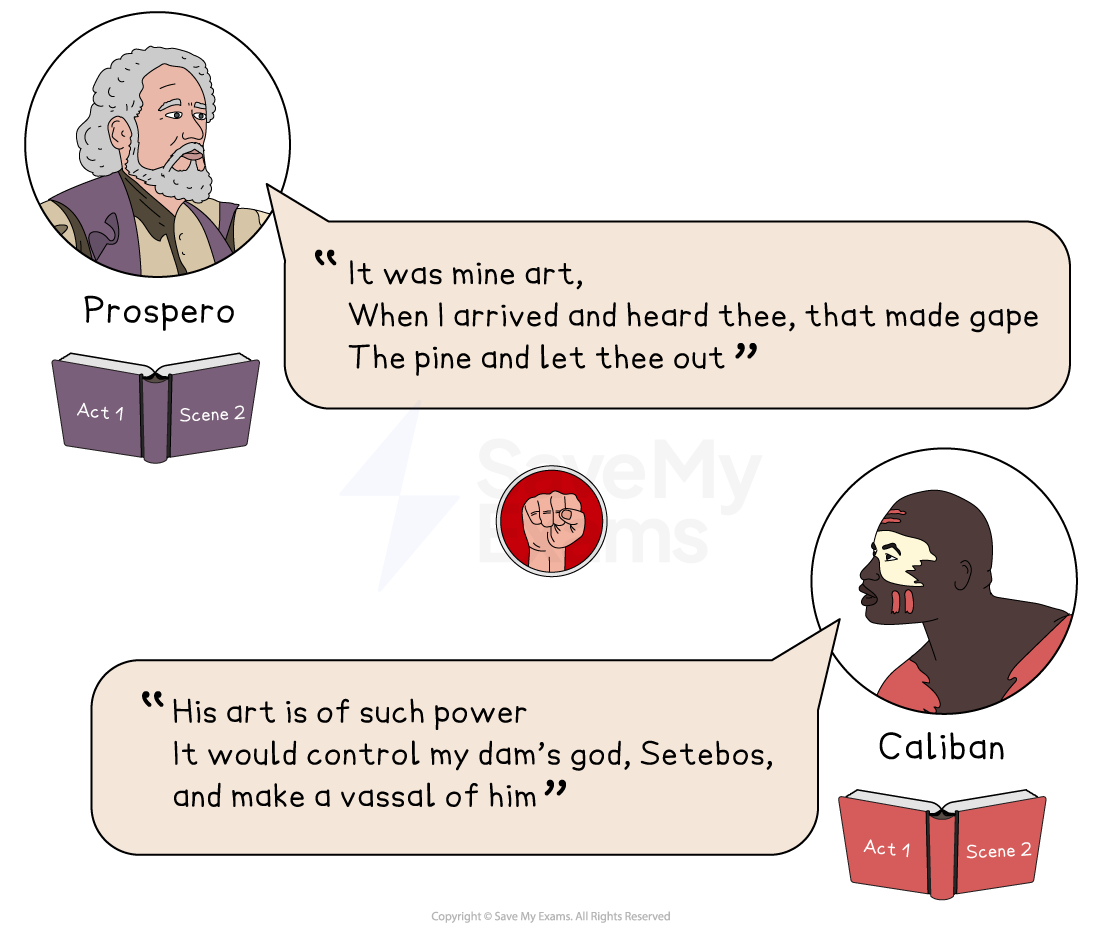
“it was mine art,
When I arrived and heard thee, that made gape
The pine and let thee out.”
— Prospero, Act 1 Scene 2
“his art is of such power,
It would control my dam’s god, Setebos,
and make a vassal of him.”
— Caliban, Act 1 Scene 2
What the quotations mean
In the exposition (opens in a new tab), audiences see Prospero’s power over the spirits on the island, in this case, Ariel:
Prospero reminds Ariel that he is his slave because it was his power (“art”) that rescued him from imprisonment in a tree
The inhabitants of the island are all under Prospero’s power:
Caliban describes Prospero as so powerful that he could control nature (the god of the dam) and make it his servant (“vassal”)
Analysis
Shakespeare immediately introduces Prospero’s power on the island as an “art” which he learned in books
However, his exploitation of Caliban and Ariel shows the misuse of this knowledge:
He controls Ariel with threats: the aggressive verb, “gape” describes how forcefully he opened the tree, implying strength and control
Shakespeare presents Caliban as a fearful victim, scared of Prospero ’s power over nature itself:
His reference to the dam god presents him as close to nature, yet submissive to it, in direct contrast to Prospero
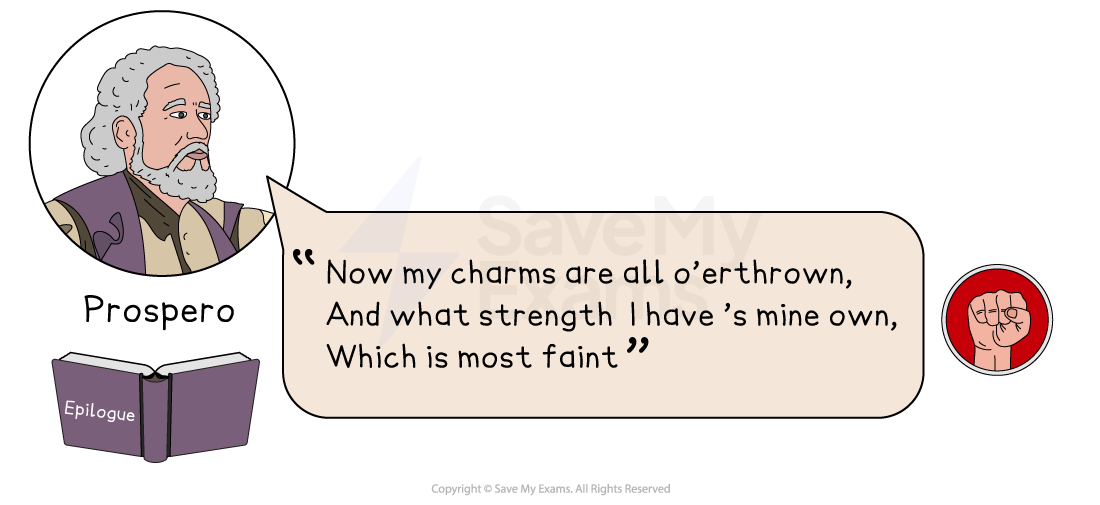
“Now my charms are all o’erthrown,
And what strength I have ’s mine own,
Which is most faint”
— Prospero, Epilogue
What the quotation means
By the denouement (opens in a new tab), Prospero has come to realise that any power he had, his “charms”, has been taken from him, and he is getting old and weak (“faint”)
Analysis
Shakespeare ends the play with a much humbler protagonist
Prospero accepts his vulnerabilities and refers to his own weakened strength, maybe connoting to his mortality
This line marks a pivotal moment in the play, as Prospero realises that human power is an illusion
Examiner Tips and Tricks
Examiners say that one of the best ways to achieve a high-level response is to dip in and out of both the extract and the whole text to select details which support your argument. It is worth mentioning that examiners reward relevant references, as opposed to testing your knowledge of quotations. This means you can use your own words to paraphrase quotes or refer to key words within them, as long as they support and illustrate your point well.
Magic and illusion
In The Tempest, magic is used to trick, mock, and wreak revenge on characters, which is a typical feature of a comedy. There is an argument that Prospero represents Shakespeare himself as he, too, weaves tangled webs and resolves conflicts as he chooses. As well as this, the play uses magic to allude to the power of nature.
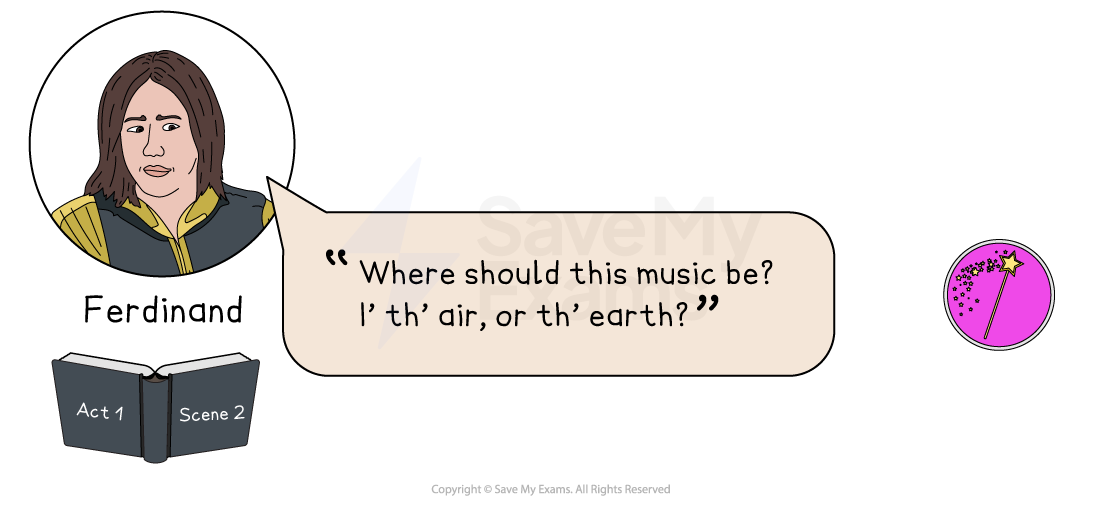
“Where should this music be? i’ the air or the earth?”
– Ferdinand, Act 1 Scene 2
What the quotation means
When Ariel is sent to trick Ferdinand, she makes him hear invisible music
He asks himself if the music is coming from the air or the earth
Analysis
Shakespeare’s Ariel is a mysterious spirit sent to trick or warn the other characters with invisible voices:
Sometimes this creates comedy and other times, like here, it is meant to confuse the characters washed up on the strange island
Ariel’s dialogue and invisible singing is poetic and surreal, creating the effect that the island itself is magical
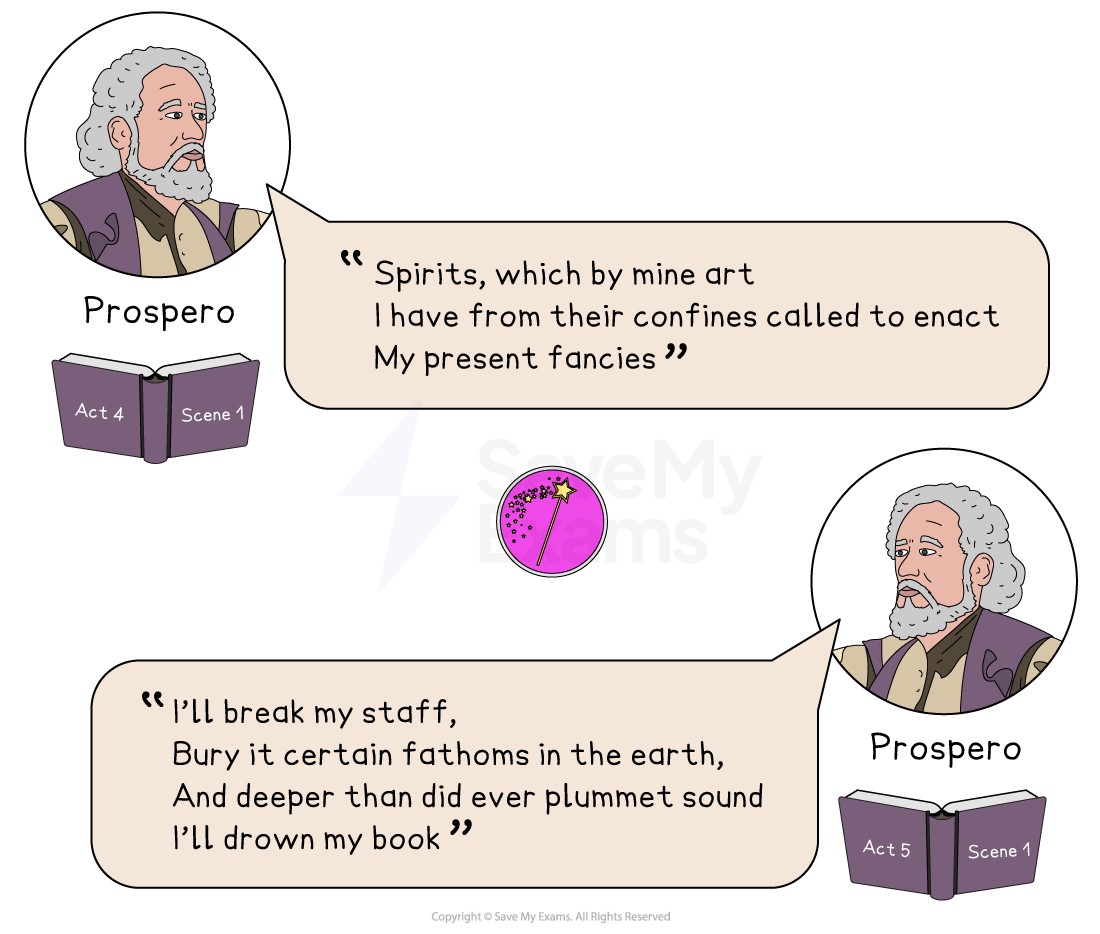
“Spirits, which by mine art
I have from their confines call’d to enact
My present fancies.”
– Prospero, Act 4 Scene 1
“I’ll break my staff,
Bury it certain fathoms in the earth,
And deeper than did ever plummet sound
I’ll drown my book.”
– Prospero, Act 5 Scene 1
What the quotations mean
At Miranda and Ferdinand’s wedding, eager to please, Prospero calls on the spirits of the island to celebrate with them, and to pay tribute to the couple:
Prospero says he uses his magic to call the spirits from their hidden places or “confines” to act out “his present fancies” when it pleases him
However, by the resolution, Prospero is determined to give up his powers
He vows to break his magic staff and bury it deep in the ground, and to throw his books into the depths of the sea
Analysis
Prospero represents knowledge: Shakespeare suggests this is a kind of magic, and is certainly very powerful
By calling the spirits from their “confines”, which connotes to a small, enclosed prison, he implies he is their master
Prospero’s phrase, “present fancies”, alludes to an impulsive desire
Prospero’s passionate dialogue in Act 5 presents his anagnorisis, a moment of realisation that his arrogant misuse of power has been harmful
Hyperbolic (opens in a new tab) descriptions reflect Prospero’s frustration with his magic
The alliterative (opens in a new tab) ‘d’ sound in “deeper”, “did” and “drown” create a melodramatic tone in a scene typical of a tragedy
Loss and betrayal
In The Tempest, Shakespeare explores how loss and betrayal can lead to extreme emotional reactions. In particular, Shakespeare examines connections between his characters’ feelings of betrayal and their need for revenge.
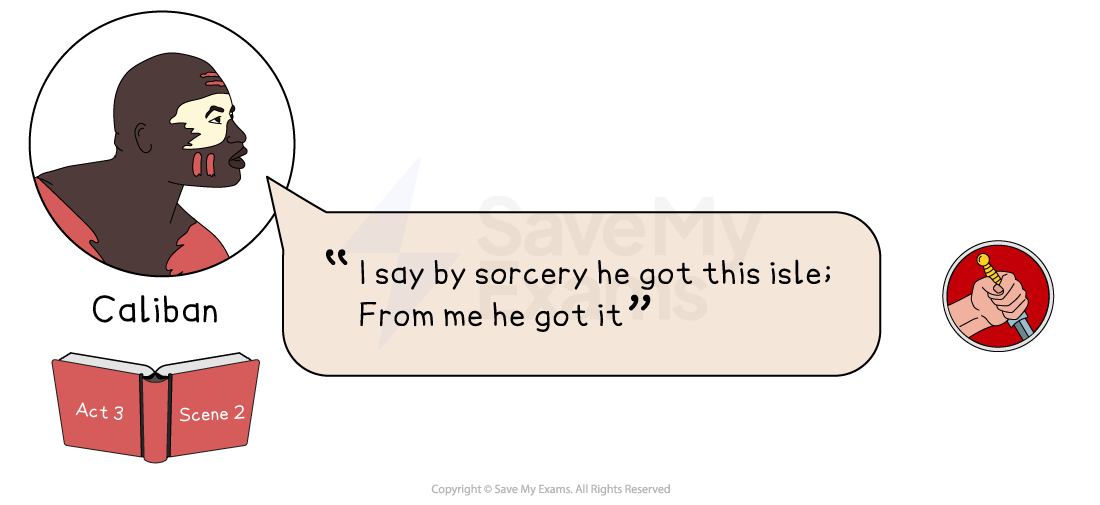
“I say, by sorcery he got this isle;
From me he got it.”
— Caliban, Act 3 Scene 2
What the quotation means
Caliban tries to persuade Stephano to help him kill Prospero; he emphasises Prospero took his island with magic or “sorcery”
Analysis
Shakespeare presents Caliban’s deep sense of betrayal here:
Caliban believes Prospero stole his island, emphasised with the short, emphatic phrase, “From me he got it”
Caliban’s rage is directed towards Prospero’s “sorcery” and trickery, presenting the conflict that results from feelings of loss and betrayal:
Shakespeare may suggest that ownership of the island is an illusion
Paired quotations
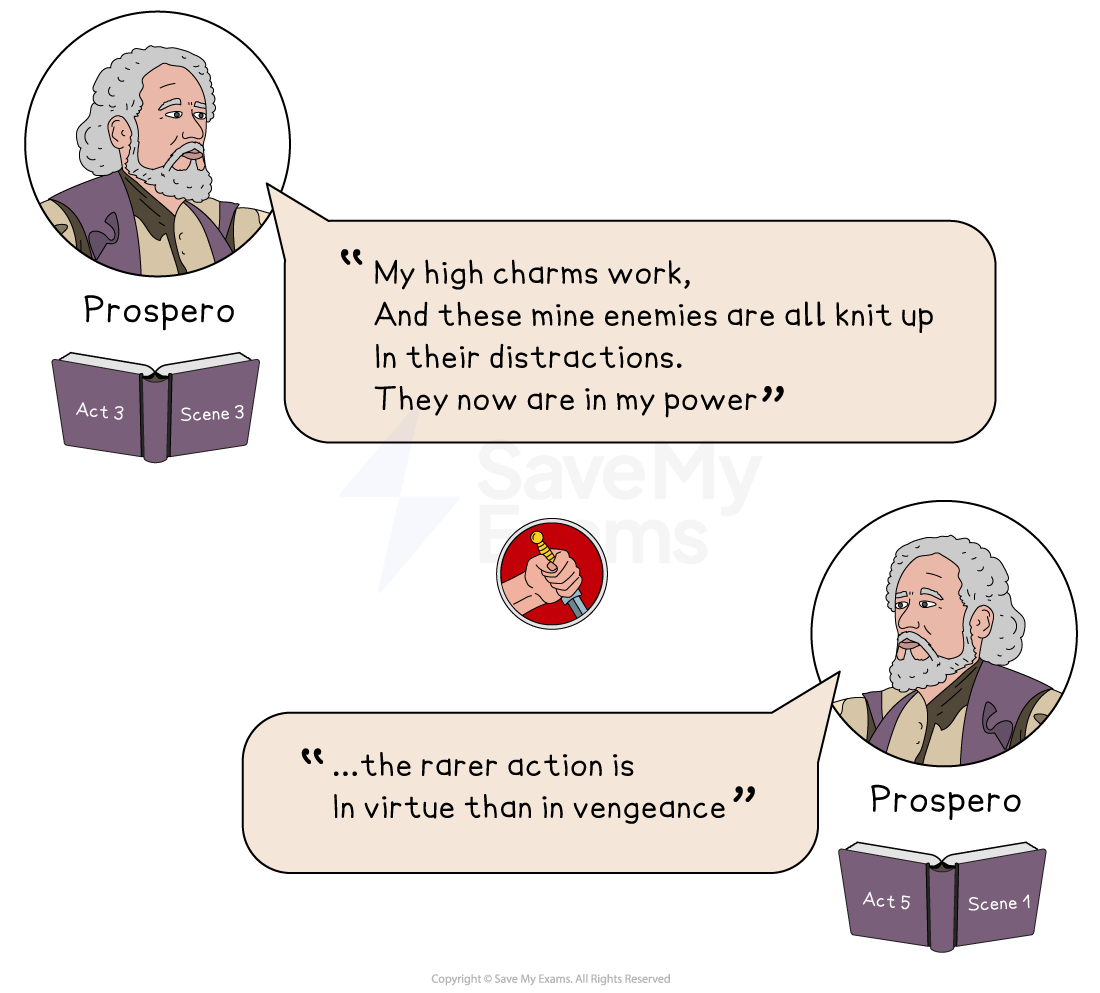
“My high charms work,
And these mine enemies are all knit up
In their distractions; they now are in my power;”
— Prospero, Act 3 Scene 3
“the rarer action is
In virtue than in vengeance;”
— Prospero, Act 5 Scene 1
What the quotation means
In the climax (opens in a new tab) of the play, Prospero considers his plan for revenge a success:
His “charms” (magic), he says, have brought him complete control over his enemies, the traitors who stole his dukedom
But by the end, Prospero decides revenge is wrong:
He says it is better, though rare, to show compassion (“virtue”)
Analysis
Shakespeare describes Prospero’s enemies as “knit up”, suggesting they are in a web of confusion, trapped in pointless distractions:
This may allude to the complex nature of betrayal and revenge
Shakespeare presents Prospero’s sense of loss as a desperate need to regain control:
This is revealed in his emphatic, rather gloating sentence: “They now are in my power”
However, the play criticises this response to betrayal:
Prospero’s alliterative and idiomatic (opens in a new tab) line reveals the play’s conclusion: forgiveness is better than revenge
Source
https://shakespeare.mit.edu/tempest/full.html (opens in a new tab)

Unlock more, it's free!
Was this revision note helpful?
